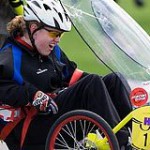Category Science & Technology
Plans for South Campus Union: green space, better facilities
For 37 years, Union South has turned a cold shoulder to the campus. And the feeling, unfortunately, has been mutual.
Web tool puts wildlife diseases on the map
A new online map makes it possible, for the first time, to track news of disease outbreaks around the world that threaten the health of wildlife, domestic animals, and people.
Groundbreaking held for Wisconsin Institutes for Discovery
Gov. Jim Doyle and UW–Madison alumni John and Tashia Morgridge joined the UW–Madison community on May 2 to celebrate the start of construction of the Wisconsin Institutes for Discovery.
Mechanical Engineering Building project wins preservation award
The addition to the 78-year-old Mechanical Engineering Building at the University of Wisconsin–Madison won an award from the Madison Trust for Historic Preservation at its annual awards ceremony this week.
Time Magazine names James Thomson one of “World’s Most Influential People”
Stem cell scientist James Thomson has been named one of Time magazine's "World's Most Influential People," with Shinya Yamanaka of Kyoto University. Last year, they each discovered a way to give human skin cells many of the characteristics of embryonic stem cells, an advance that avoids the destruction of embryos.
A weekend of success for UW–Madison engineering teams
The University of Wisconsin–Madison formula car, concrete canoe and steel bridge teams excelled in competitions the weekend of April 25-27.
Spiraling nanotrees offer new twist on growth of nanowires
Since scientists first learned to make nanowires, the tiny wires just a few millionths of a centimeter thick have taken many forms, including nanobelts, nanocoils and nanoflowers.
Stem cell pioneer Thomson elected to National Academy of Sciences
Pioneering University of Wisconsin–Madison stem cell scientist James Thomson was elected today (April 29) to the National Academy of Sciences.
Recent sightings: Human Powered Vehicle Challenge
Photos: Jeff Miller UW–Madison’s human powered vehicle team competed against teams from around the country at Sauk Prairie Airport…
UW-Madison students again rise to the entrepreneurial challenge
For the second straight year, students at the University of Wisconsin–Madison flexed their entrepreneurial muscle as they turned surplus materials into new creations.
With cell as muse, art fuels scientist’s quest
For Ahna Skop, the tipping point to a career in science was a dance and a food fight.
Facility gives geology department new dimension
A geoscience visualization lab that opened last week in Weeks Hall will add a new dimension to geology research and education at the University of Wisconsin–Madison.
UW-Madison nano research mixes with art, coffee
In May, 14 striking, larger-than-life photographic prints that are both comfortingly organic and starkly abstract will enable patrons of Mother Fool's Coffeehouse in Madison to visualize a scientific world that's rarely seen outside the laboratory.
Roche NimbleGen CEO Stan Rose to speak on exit strategies for start-up companies
Stan Rose, president and CEO of Roche NimbleGen, a manufacturer of gene chips for pharmaceutical research, will speak about successful exit strategies for start-up companies on Monday, April 28 at 5 p.m. at the Fluno Center, 601 University Avenue. The event is free and open to the public as part of the Gilson Discovery Series hosted by the Wisconsin Alumni Research Foundation (WARF).
UW’s computing research prowess brings Microsoft to Madison
Microsoft, the world's largest computer software company, will open an advanced development laboratory in Madison later this spring, helping expand on a highly productive 20-year research and alumni relationship between the company and the University of Wisconsin–Madison computer sciences department.
UW-Madison will host human-powered vehicle challenge
The University of Wisconsin–Madison this weekend will host the 25th annual American Society of Mechanical Engineers Human Powered Vehicle Challenge.
UW-Madison part of DOE-funded ‘microgrid’ collaboration
University of Wisconsin–Madison engineers will collaborate with industrial and government partners on a $14 million project to implement a microgrid power backup system at the nation's fifth-largest incarceration facility-the Santa Rita Jail.
We Conserve energy conservation initiative yields results
An energy-saving campaign launched at the University of Wisconsin–Madison two years ago has identified annual energy savings of $3.7 million and reductions of carbon dioxide emissions by an estimated 28,000 tons a year.
Professor blends ecology, history
As a University of Washington graduate student in the late 1980s, Nancy Langston traveled to a national park in Zimbabwe to study an endangered bird. She came back with a resolve to know more about people.







